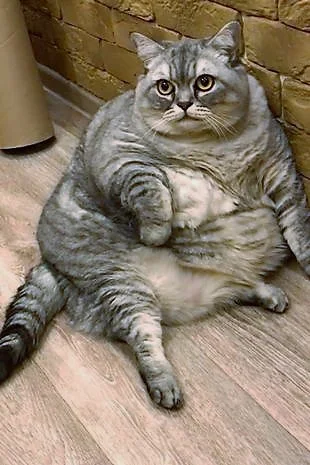NEWS AND COMMENT-UK: This is a story, currently in the news media, which essentially repeats what concerned cat owners already know, namely that there is an obesity epidemic among UK's domestic cats. The same, by the way, applies to America's cats. In fact, as I understand it, it is worse in America but there's not much difference.
 |
| 2022 - the world's most obese domestic cat? Name: Liznya (Russia) |
It's a known fact that obesity can lead to type II diabetes. This occurs in humans. The same thing is happening in our domestic cats. This is unsurprising because humans feed domestic cats. If they feed themselves too much, they feed their cats too much as well. It's a well proven formula 😒.
On my understanding of the process of obesity causing Type II diabetes, it is the fat which gathers around the organs which makes them malfunction. This applies to the pancreas which produces insulin. When the pancreas malfunctions there is less insulin in the bloodstream and blood sugar levels increase. This is the beginnings of Type II diabetes.
More than 3 million domestic cats in Britain are overweight. Sadly, it seems that Covid has increased the problem. A survey by Cats Protection indicated that more than 25% of the 2,000 cat owners polled admitted to overfeeding their cat during the Covid lockdown in March 2020.
In The Times newspaper today, January 28, 2022, they report on an interesting study carried out at the Medical University of Silesia, involving 750 Polish adults with an average age of 35. They found that most people are unable to correctly estimate their own body size, and that men are worse than women when it comes to judging whether they are a healthy weight. They think they are skinnier than they are. And people tend to normalise their weight to believe that they are a normal weight when they are overweight. Also, there's a stigma about being overweight which tends to make people underestimate.
Less than half were able to correctly estimate where they stood on a weight scale from underweight, normal weight to overweight or obese. They also frequently underestimated their body mass index, a measure of whether somebody is a healthy weight. The research is published in Scientific Reports.
If a cat owner is unable to estimate whether they are obese or not they are highly unlikely to be able to do the same thing for their cat. I have said this before but obese people tend to normalise obesity and a lot of cat owners think that their cat is a normal weight when they are in fact obese.
RELATED: Average domestic cat weighing 13 pounds is at a high risk of developing type 2 diabetes.
The Royal Veterinary College in the UK, is asking cat owners in Hertfordshire, Buckinghamshire, Bedfordshire and in London to enrol their diabetic cats in a new dietary trial. Is your cat eligible?
To take part in the trial your cat must have been diagnosed with diabetes mellitus for six months. This, in my book, is Type II diabetes. If your cat is enrolled, he or she will be placed on a test diet for 12 weeks. They will also assess the cat's long-term outcome. The diet is an ultra-low carbohydrate diet. It will be free to cat owners.
RELATED: Can cats be cured of diabetes?
It has been conclusively shown in humans that losing weight can have a dramatic improvement in health vis-à-vis diabetes. Diabetes can go into remission with even relatively modest amount of weight loss on my reading of the information in the news media.
You will have to bring your cat to 5-7 outpatient appointments at the Queen Mother Hospital for Animals near Potters Bar, in Hertfordshire.
RELATED: Cat diabetes – home treatment – first-hand experience.
The assessment will also look at whether the microbiome in your cat's gut changes as it changes with respect to humans when they reverse the diabetes.
One owner talks of the benefits of weight loss and eliminating diabetes. Her name is Rachel Fortescue. She lives in Fratton, Essex, UK. She put her diabetic Burmese cat, Lester, through the pilot scheme last year which reversed diabetes.
She told The Telegraph newspaper:
"I have watched Lester turn back into a happy, affectionate, playful cat again as the symptoms of his diabetes has disappeared and for that I am eternally grateful."



No comments:
Post a Comment
Your comments are always welcome.
Note: only a member of this blog may post a comment.